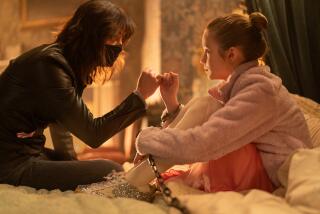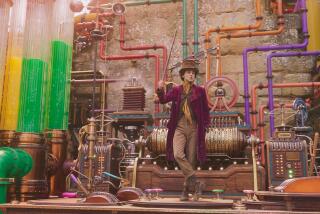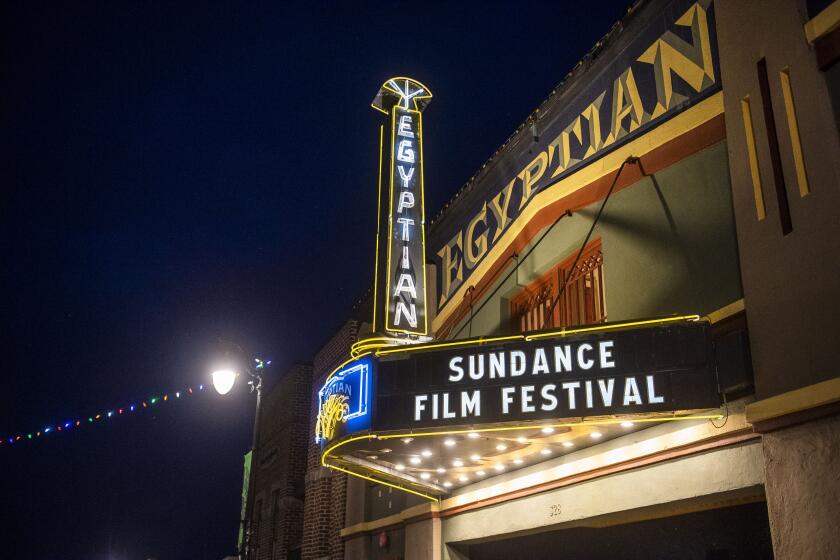Director Leaves Laughs Behind to Capture Spirit of ‘Ghost’ : Movies: A suspense drama about the afterlife is the last film you’d expect from Jerry Zucker, one of the crazy guys who dreamed up ‘Airplane!’
The sign on the door indicates that Zucker Brothers Productions shares its West Los Angeles office suite with a dentist named Millard E. Flausner. A telephone about four times normal size sits in the conference room. The walls are dominated by posters for the goofy, anarchic comedies written and directed by Jerry and David Zucker and Jim Abrahams--movies like “Airplane!” and “Top Secret!”
So why is Jerry Zucker, at 40 the youngest member of a team whose comedy style some have compared to the Marx Brothers, participating in an interview that explores such issues as spirituality and metaphysics?
For the record:
12:00 a.m. July 18, 1990 For the Record
Los Angeles Times Wednesday July 18, 1990 Home Edition Calendar Part F Page 8 Column 2 Entertainment Desk 2 inches; 37 words Type of Material: Correction
Wrong credit--Bruce Joel Rubin, who was identified in an article in Friday’s Calendar as the author of the screenplay for “Brainstorm,” was formally credited with writing the story for that film. The credited screenwriters were Frank Messina and Robert Stitzel.
For the Record
Los Angeles Times Saturday July 21, 1990 Home Edition Calendar Part F Page 4 Column 1 Entertainment Desk 1 inches; 19 words Type of Material: Correction
Incomplete name--Philip Frank Messina was co-screenwriter of “Brainstorm.” His full name was not given in a Wednesday correction.
Because “Ghost,” the first movie Zucker has made by himself, is a suspense drama about the afterlife. In other words, it’s the last film you’d expect from one of the crazy guys who dreamed up “Airplane!”
Both Paramount Pictures, which releases “Ghost” today, and the filmmaker are understandably concerned that moviegoers are anticipating something closer to “Ghostbusters.”
“It is impossible to categorize the movie,” Zucker said. “It doesn’t fit into any specific, familiar genre. I think of it as a romance and a drama with comedy and suspense. At its heart, though, the movie is not a comedy.”
Zucker insists that he wasn’t deliberately trying to break with his comedic past or “to express a different side of myself. I was just looking for a good film to direct.”
What he came across was Bruce Joel Rubin’s script for “Ghost,” which, like Rubin’s other screenplays--”Brainstorm” and the upcoming “Jacob’s Ladder”--examines worlds beyond the physical realm.
In the film, Patrick Swayze plays a New York banker who is killed by a mugger but remains on Earth as a ghost. Watching over his grieving lover, Demi Moore, he soon realizes she is in mortal danger. In desperation, he manages to communicate with her through Whoopi Goldberg, a fake psychic who is astounded to discover that her powers are real.
“What I loved about the script, right from the beginning, was that it was written by someone who really believes in the spiritual world and takes these issues seriously,” Zucker said. “Bruce didn’t wake up one day and say, ‘I have a nifty idea for a commercial movie.’ The script was written from his heart.”
But first Zucker had to persuade the distraught screenwriter of his good intentions.
“I wanted Milos Forman or Stanley Kubrick (to direct the movie),” Rubin said. “When I was told that the guy who made ‘Airplane!’ was going to direct ‘Ghost,’ I cried. Then when I met him, he said he wanted to make changes in the script. He wanted to change my baby. It was very distressing.”
The two agreed to go to dinner together. The only rule was that neither would discuss the script. By evening’s end, Rubin said, “I fell in love with the guy. He’s warm, funny and deeply philosophical. You would never expect that, from his comedies.”
The two went through 19 drafts of the screenplay together. Everyone agrees the original script was much darker.
“I felt it needed more twists and turns,” Zucker said. “It needed to keep moving. All those zany comedies have instilled a sense of pace in me. And, yes, I added more humor. Actually, a lot of the work I did was take things in Bruce’s head, which weren’t clear in the script, and help translate that into something a mainstream audience could grasp and digest.
“People keep asking if I believe in ghosts,” Zucker added. “If you’re talking about poltergeists and weird, supernatural phenomena, not really. I have no idea what’s possible in that realm. But if you are asking if I believe all of us have souls that exist with the physical self, the answer is yes. And I believe the soul does continue on after the body dies.”
To Goldberg, Zucker “had such a definite vision of what he wanted to do, we were a couple of weeks into filming before I discovered he hadn’t (directed) on his own before.”
Where Zucker did need help, Goldberg said, was in his transition from directing comedy to directing something entirely different.
“Making the movie was a learning experience for him. We weren’t in a gag film like ‘Airplane!’ with sight gags and double-entendres. We had to teach him a bit more about actors doing characters and playing motivations. Lucky for us, Jerry was very naive and therefore very open. . . . What I mean by naive is he loves movies the way Spielberg does and wants to make great movies. So he allowed us to have our tense moments without it being personal. If something got the actors uptight, he’d really listen.”
The shoot was difficult, since special effects had to be blended with scenes that had both dramatic and comedic elements. Howard W. Koch, under whose production banner the film was made, observed, “Jerry didn’t walk away from any scene until he got what he wanted.”
Koch, who produced “Airplane!” 11 years ago, said that it was Zucker who usually worked with the actors during the making of that movie. The other two directors would huddle around a monitor in the back of the airplane mock-up, communicating with him over headphones.
But the days of triumvirate direction ended after “Ruthless People.” “It’s hard enough to find a film one wants to do, much less three,” Zucker said.
When the Zucker brothers and Abrahams opened the Kentucky Fried Theater in an abandoned warehouse on Pico Boulevard in 1972, they were among the first comedy groups to shun political commentary for media satire. Their troupe, which mixed live skits with videotaped and film sketches, mocked the dramatic and commercial excesses of film and TV.
This continued on into their movies, first “Kentucky Fried Movie,” a collection of short parodies of movie trailers directed by John Landis, then “Airplane!,” a spoof of airport-disaster movies.
“It was a style of humor we spent years and years developing,” Zucker said. “So by the time we got on a set, it was only a matter of solving problems and not arguing about how the production would look or the style of the humor. For first-time directors, it helped to have more than one head.”
Then came “Ruthless People,” a film the trio directed from a script by Dale Launer. The film’s different style made it difficult for the three to work together.
“It was not hell, exactly,” Zucker said, “but it became evident that if we were going to do (scripts written by other people), we’d have to direct separately.”
Abrahams made his solo debut with “Big Business,” starring Bette Midler and Lily Tomlin. Then David Zucker directed “The Naked Gun,” a movie derived from the team’s 1982 television series, “Police Squad!” Abrahams is now developing projects at his Abrahams Entertainment Corp., while the Zuckers have about 10 projects going at their production company, including “Naked Gun 2 1/2,” a sequel the brothers are creating with Abrahams and writer Pat Proft.
Meanwhile, Jerry Zucker nervously awaits reaction to a film that may well confound audience expectations.
“The movie is a roller-coaster ride where weird and funny things happen. But it would be great if we got people to see their lives in a new context, like maybe considering if they have a soul or if there is a spiritual world.”
More to Read
Only good movies
Get the Indie Focus newsletter, Mark Olsen's weekly guide to the world of cinema.
You may occasionally receive promotional content from the Los Angeles Times.






